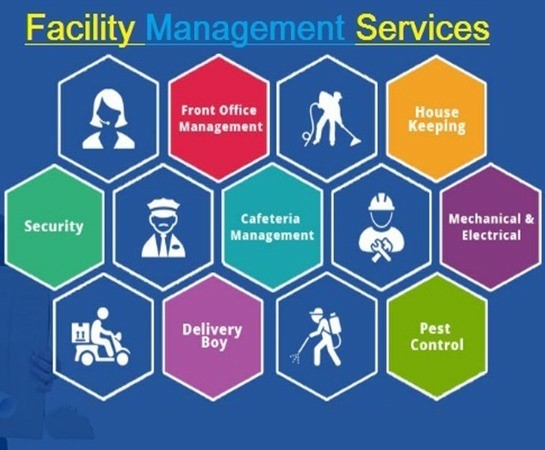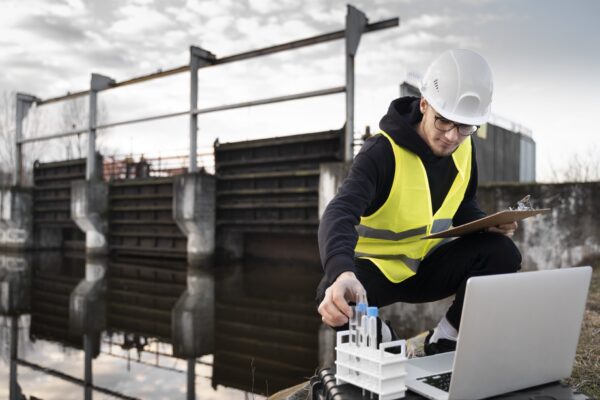Facility Management is an organizational function which integrates people, place and process within the built environment with the purpose of improving the quality of life of people and the productivity of the core business.
Why is FM relevant?
The FM industry is growing rapidly, and the COVID-19 pandemic made safety and health a top priority. Changes to technology, green initiatives and other current trends are changing how FM teams conduct business and respond to everyday challenges.
Facility managers are a crucial part of every organization because they ensure that the places where we work, play and live are safe, comfortable, sustainable and efficient. Facility managers contribute to an organization’s strategy and bottom line in a variety of ways.
- Contribute to operational efficiencies
- Plan and deliver infrastructure needs to support productivity
- Manage risks including those to facilities, employees, suppliers and business reputation
- Mitigate and reduce environmental impact
- Promote sustainable tactics for long-term cost management
- Leverage technological solutions
- Mitigate and overcome effects of natural disasters
- Guarantee compliance
- Leverage security
FM continues to be an important part of returning to the office after the pandemic. Ensuring that offices meet the needs of changing organizations and evolving workforces, and guaranteeing the safest workplaces possible, has become the focus of many facility managers. The profession is also starting to impact environmental, social and corporate governance issues. Facility managers help support how each organization works toward social goals, including responsible and ethical investing, sustainability and overall impact, instead of only focusing on the bottom line.
What is facility management?
An effective facility management system and manager will possess expertise in the following 11 core competencies, as defined by the International Facility Management Association:
Better ensures the facility is safe, healthy and secure for workers, and furthermore fosters an environment of support, innovation, diversity and development — all of which ultimately benefit the organization. Human resources functions such as performance assessment and goal setting factor into this competency.
Closely oversees and tracks maintenance practices, issues and systems throughout the facility. While maintenance personnel are responsible for day-to-day functions, the facility manager develops maintenance strategy and planning.
Identifies opportunities for sustainable processes and technology to benefit the external environment as well as facility operations. Develops, implements and oversees sustainability practices and enhances them as warranted.
Stays up to date with industrial maintenance technology, and identifies and implements opportunities for technology upgrades throughout the facility. Manages installation, planning and evaluation for new technology.
Creates emergency management and continuity plans for unexpected events. Designs and manages emergency testing and simulation to assure preparedness throughout the organization.
Oversees, at a high level, all communication throughout the facility — including announcements, maintenance notices, process reminders, mission statements and safety communication. Provides input on communication methods, channels, messaging and more. Reports on communication effectiveness to stakeholders.
Creates performance and quality standards, including benchmarks, assessment methodology, metrics, best practices and service level agreements. Closely monitors quality performance and creates and implements improvement plans as necessary. Measures and reports on quality for the organization.
Is highly visible as a competent leader in all aspects of facility operations. Provides support and assistance wherever requested and required. Advocates on behalf of the facility as an asset. Provides communication and transparency into processes and strategy, and solicits feedback for improvement from all levels throughout the organization. Remains up to date on facility best practices, and is a thought leader.
Understands, identifies and manages real estate needs — including facility footprint and external environment. Plays a key role in real estate acquisition, leasing, sales and portfolio management.
Identifies project needs and manages personnel, vendors, contracts, budgets, evaluation and reporting on project results.
Understands and prepares financial documents and reports including budgets, contracts, balance sheets/P&Ls, procurement, chargebacks and more. Collaborates as necessary with accounting and finance personnel to assure copacetic financial practices.
Benefits of effective facility management
The benefits of a competent, effective facility manager, and thus effective facility management, are many. A successful facility manager is a vocal, visible advocate for continuous improvement throughout the facility — especially in high-value, high-impact areas such as technology, maintenance, process, sustainability and more. ATS can help take facility management to the next level, with:
Comprehensive factory maintenance, implementing cutting-edge maintenance technology and fulfilling maintenance processes with highly trained, specialized personnel
Staffing solutions — utilizing our recruiting and training processes and strategies, and freeing the facility manager to focus on more specialized tasks
Maintenance technology, introducing data-driven practices such as predictive maintenance, remote monitoring and industrial sensors.
- Maintenance and operations (Apartments, Industrials, Commercial complex)
- Space planning and management
- Energy management
- Environmental sustainability
- Health and safety
- Emergency preparedness and business continuity
- Capital project management
- Real estate and property management
- Technology and infrastructure management
- Customer service
Benefits of Effective FM
- Cost savings
- Enhanced employee productivity and satisfaction
- Improved asset utilization and lifespan
- Reduced risk and liability
- Better alignment with organizational goals and objectives




